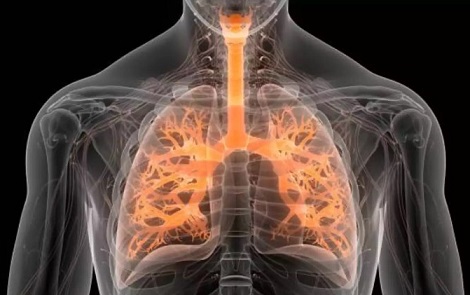Nikhil Prasad Fact checked by:Thailand Medical News Team Nov 15, 2024 1 year, 2 months, 4 weeks, 1 day, 1 hour, 33 minutes ago
Medical News: Researchers from several prestigious Mexican institutions have shed light on a complex complication in COVID-19 survivors - pulmonary fibrosis. This condition, often a sequela of severe infection, has been linked to increased mast cell (MC) activity in the lungs. Led by Yatsiri G. Meneses-Preza and colleagues from the Instituto Politécnico Nacional, Centro Médico Naval, and the Instituto Nacional de Psiquiatría, this study identifies carboxypeptidase A3 (CPA3) as a key player in lung tissue damage and fibrosis following COVID-19 infection.
 COVID-19 Linked to Dangerous Lung Scarring Through Mast Cell Activation
Understanding Pulmonary Fibrosis in COVID-19 Survivors
COVID-19 Linked to Dangerous Lung Scarring Through Mast Cell Activation
Understanding Pulmonary Fibrosis in COVID-19 Survivors
Pulmonary fibrosis (PF) involves scarring of lung tissue, which can lead to chronic respiratory issues. While initial COVID-19 research focused on fighting the infection, long-term outcomes like PF in recovered patients are only beginning to gain attention. This
Medical News report reveals that severe COVID-19 often triggers excessive inflammatory responses, causing lasting lung damage. Patients who survived the infection but endured intensive therapies like oxygen or mechanical ventilation may face ongoing respiratory issues due to Pulmonary fibrosis (PF).
Why Mast Cells Matter in Lung Inflammation
Mast cells (MCs) are immune cells traditionally associated with allergic reactions but are now understood to play a role in inflammatory processes. In COVID-19 cases, Mast cells (MCs) seem to contribute significantly to lung inflammation and tissue damage. The team investigated CPA3 - a specialized enzyme found in MCs - to explore its role in promoting fibrosis in post-COVID lungs.
The study found a substantial increase in CPA3-positive MCs in the lungs of deceased COVID-19 patients, particularly in areas with pneumonia, around damaged blood vessels, and within fibrotic tissue. This article explains that the presence of CPA3-positive MCs correlates strongly with fibrosis, suggesting that these cells exacerbate lung damage, promoting scar tissue formation that leads to PF.
Key Findings of the Study
The research team analyzed lung tissues from fourteen deceased patients, eight of whom had severe COVID-19. Their findings offer new insights into how MCs contribute to PF development:
-Elevated CPA3 Levels in COVID-19 Patients
The study revealed an increase in CPA3-positive MCs specifically in damaged areas of the lungs in COVID-19 patients. These cells were found in regions with severe pneumonia, near thrombotic blood vessels, and in scarred, fibrotic tissues. This presence of CPA3-positive MCs suggests an increased inflammatory response that harms lung repair mechanisms, leading to tissue scarring.
-CPA3 and its Connection to Tissue Damage
CPA3 is a metalloprotease that degrades proteins and influences blood vessel function. It’s typically stored in MC granules and released during inflammation.
In COVID-19, CPA3 levels were notably higher than in the control group, highlighting a unique activation of MCs in response to the virus.
-Mast Cells in Fibrotic and Thrombotic Lung Areas
The presence of MCs, particularly in fibrotic areas, provides a clue into how inflammation may lead to long-term lung damage. The study also found that the number of CPA3-positive MCs was significantly correlated with the extent of fibrosis. High levels of CPA3-positive MCs were strongly linked to fibrosis development, marking them as potential contributors to the formation of scar tissue in COVID-19 lungs.
Potential Mechanisms: How Mast Cells Worsen Lung Damage
The role of MCs in promoting fibrosis was demonstrated in multiple ways:
-Degranulation and Inflammation
MCs release various substances that can increase vascular permeability and recruit additional immune cells. When MCs degranulate, they release CPA3, tryptase, and chymase, enzymes known to break down tissue structures and compromise lung repair.
-Interaction with Lung Fibroblasts
The study suggests that tryptase and CPA3 may promote fibroblast activity, causing these cells to proliferate and deposit collagen in the lungs. This deposition hardens lung tissue, reducing its flexibility and contributing to fibrosis.
-CPA3’s Unique Role in PF Development
Although CPA3 has been less studied compared to other MC enzymes, it appears particularly important in PF due to its ability to degrade specific proteins that regulate blood vessel function. CPA3 breaks down endothelin-1 and angiotensin, both linked to fibrosis, creating a local environment in the lungs that favors scar tissue formation over healing.
Conclusion: Implications for COVID-19 Survivors and Future Treatment
The findings of this study highlight CPA3-positive MCs as significant players in lung damage among COVID-19 patients, pointing to potential treatment options. Targeting CPA3 and MC activity may offer new avenues to manage or prevent PF in COVID-19 survivors. This research could open doors to therapies that mitigate inflammation and scarring, aiming to improve respiratory health outcomes for those affected by severe COVID-19.
The study findings were published in the peer-reviewed: International Journal of Molecular Sciences.
https://www.mdpi.com/1422-0067/25/22/12258
For the latest COVID-19 News, keep logging on to Thailand
Medical News.
Read Also:
https://www.thailandmedical.news/news/how-calcium-signals-could-unlock-better-treatments-for-heart-and-lung-fibrosis
https://www.thailandmedical.news/news/russian-researchers-find-that-vitamin-d-can-help-combat-lung-fibrosis
